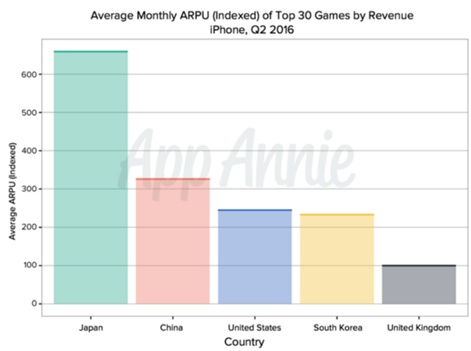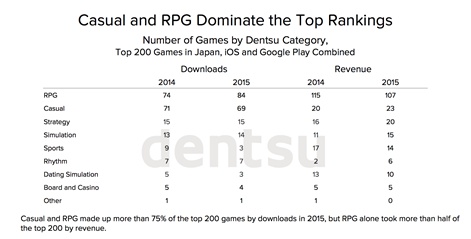Johannes Heinze is Managing Director, International at AppLovin.
The Japanese mobile games market is one of the most unique, lucrative, and challenging markets for Western games developers.
The financial opportunity is vast - Japan has the world’s third biggest games market. Japan sports a rich heritage for making some of the finest mobile gaming experiences in the world.
They’re pioneers in gaming, often setting new standards for excellence and innovation in game design, marketing and F2P monetisation mechanics.
Importantly, the Japanese gaming community is unique because despite a relatively small population of gamers when compared to the US or China, the ARPU for Japan is far greater than any other geo in the world.

In 2014, Japanese games publisher GungHo Entertainment's Puzzle & Dragons became the first mobile game to smash the billion-dollar revenue barrier. Make no doubt about it - breaking Japan isn’t an easy task, as it has unique tastes, idiosyncrasies and potential barriers to entry.
This article provides a useful checklist of what you should consider before taking your games East. Despite gameplay being a universal constant, the execution of your game delivery and localisation are key to success for launching Western games in Japan.
Check 1: Qualify your game for Japan
Check if your game is a good fit for Japanese gamers. RPGs rule in mobile game genres in Japan. If you’ve got a marvellous 3D shooter in the works, it’s probably a good idea to steer clear of Japan (or at least de-prioritise it as a potential market).
But, if you’re in the midst of developing the next Legend of Zelda, then you’re in with a good chance of success. See Dentsu/App Annie research below on the top game genres in Japanese mobile gaming.

Check 2: Adapt your F2P monetisation methods
The top grossing mobile games in Japan are powered by gacha mechanics. If you’re in the planning stages of game development with aspirations to launch in Japan, investigate whether you can seamlessly include gacha into your game in order to appeal to local audience’s experiences.
The word gacha is derived from “Gachapon,” Japanese vending machines which dispense capsules containing toys that usually belong to a collection of manga, cartoons, or movie characters.
The main goal of playing gacha is to complete a set or collection, and as users don’t know what toy they will obtain, they usually have to spin or play gacha multiple times to complete their set.
In Japan, gacha (in the virtual sense) are used to monetise free-to-play games, as gamers usually have to pay with real world or in-game currency to spin a gacha. In many Japanese F2P mobile games, playing gacha is the only way to acquire powerful items, boosts, new weapons and other useful in-game assets.
Check out this in-depth blog from Dr. Serkan Toto, which details some of the most popular types of gacha available. It’ll give you some great ideas about which types of gacha there are for you to integrate into your mobile game.
Check 3: Explore local agencies
The Japanese market is dominated by resourceful local agencies. Explore using them to further tailor your game’s design and messaging for local audiences. This will enable you to further tap into Japanese design styles and sensibilities.
It’s not enough to simply convert text into Japanese. Hyper-localising your game will make it culturally relevant.
For example, when Supercell decided to launch Clash of Clans in Japan, they hired Tokyo-based creative agency UltraSuperNew. They delivered a creative campaign which communicated the Clash of Clans brand in an entertaining fashion, by using its bold assets with powerful call-to-action messaging.
Check 4: Hyper-localise your game
Make sure you adapt your game for local tastes and preferences. It’s a good idea to hire native Japanese talent, or indeed someone with significant Japanese games development experience. Translation and the copy in your games needs to be 100% accurate to appeal to Japanese mobile gamers.
It’s not enough to simply convert text into Japanese. Besides avoiding the potential for embarrassing errors, hyper-localising your game will make it culturally relevant in context of the rest of the games your players interact with.
Check 5: Marketing your game in Japan
Japan is a leader for delivering creative, detailed narrative ecosystems of content around games.
Japanese gamers favour much deeper game storytelling than Western gamers tend to. This is underlined by the fact that RPGs are the most popular game genre in Japan.
If you have the resources, look into commissioning a manga cartoon series for your mobile game. Some examples of anime built to support mobile gaming IPs include Monster Strike, Pokémon, and Divine Gate.
And of course, leveraging existing IP of manga, cartoons and movie characters is a very effective strategy for growth, but again, only if you have the resources.
Japanese gamers are also keen on gaming influencers. Many developers create YouTube content themselves as a way to further connect with their audiences.
For example, Mixi, the developer of Monster Strike, creates a steady stream of educational videos which discuss new features and functionality for their game. Mixi has been very successful in making its developers influencers with their highly engaged community of fans.
Conclusion
Japan can be a huge opportunity for Western developers who have the right game and approach.
It is key to localise all aspects of your offering, including marketing, employing local talent, leveraging IP with built-in audiences and exploring partnerships with established Japanese networks.
Launching into Japan isn’t for the timid, but for those with a good game in the correct genre who research and localise correctly, the rewards can be considerable.
Note: Special thanks to Nori Hayashi, Sr Director of Sales For AppLovin Japan for editing this post.

















